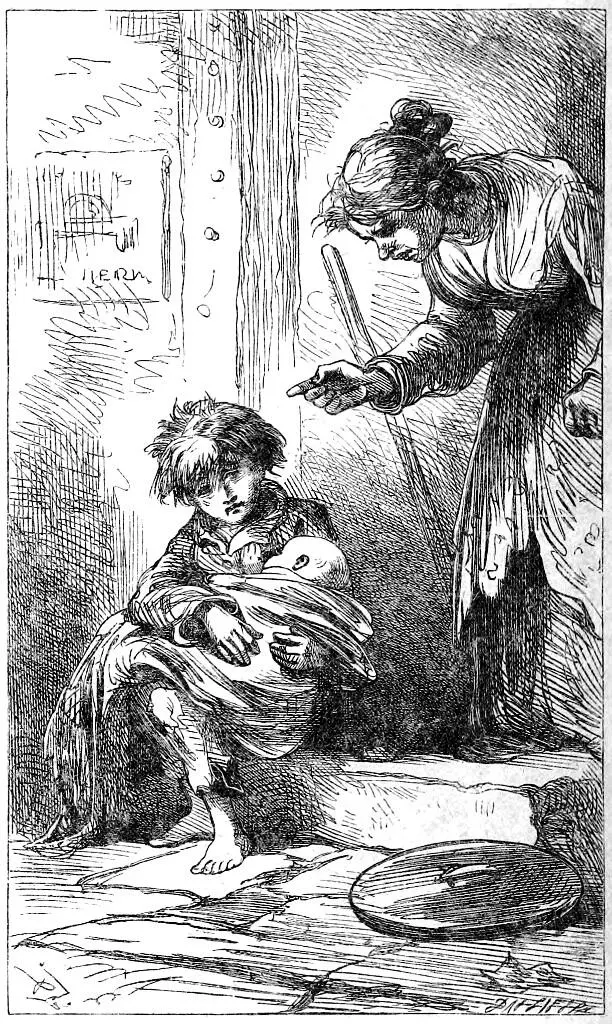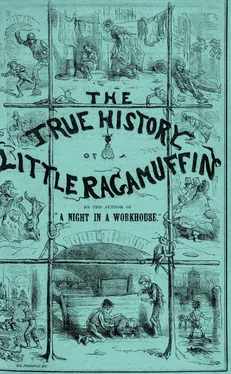“Well, who is it?” said he, looking serious.
“Why, Mrs. Burke.”
“Say it agin. Think what you are a-goin’ to say, and say it slow.”
“Mrs. Burke.”
“Werry good. Now hark to me. Let that be the last time you let that name pass your lips, ’cos it’s wrong. Her name ain’t no more Burke than it is Green or Tomkins.”
“Isn’t it? What is it then, father?”
“It’s mother, that’s what it is. You’ve had a good long spell of rest off calling anybody mother, so now you can go at it agin hearty. D’ ye understand? You’ve got to call her mother, and to act by her as a mother. If you don’t you’ll ketch something wot you won’t like; so I tell yer.”
There was not much to cry about in this last observation of my father’s, but somehow I fell directly to crying instead of answering him. It couldn’t be that I was grieved to hear the news of his marriage, for what possible difference could it make to me? That it gave Mrs. Burke more authority over me was true from a legal point of view, but unless it likewise conferred on her additional powers of spite and muscle, I couldn’t possibly be a loser by the change.
“Well; what do you say?” continued my father, gruffly. “Ain’t you got so much as thanky to say? Ain’t you glad to get another mother?”
I made him no answer. I don’t know whether it was owing to his using the word mother so repeatedly, but I couldn’t speak for crying.
“Now what’s the little beggar snivelling about?” observed my father, savagely; and turning to Mrs. Burke, “Well, I’m cust! I suppose I am to ask his pinion as to what’s good for me, am I?”
“Don’t mind him, my dear,” said his new wife; “he can be as cross-grained as Ould Nick when he takes it into his head, as well to my sorrow I have been made to know many and many’s the time, though I was never the woman to throuble you, Jim, wid my complaints. But there, I needn’t tell you nothing wus of him than you know.”
I know that she alluded to the scandalous affair of the half-crown, (she was continually alluding to it as a means of turning my father’s wrath against me when it suited her purpose,) and I had it on my tongue to give her a saucy answer. I suppose the strange young man detected my intention, for he winked at me in a good-humoured sort of way to hold my tongue, and beckoned me towards him.
“Lor, don’t be too hard on the youngster,” said he. “It ain’t them as is hurt cries most. P’r’aps he’s crying because he’s so jolly glad to get another mother. How old is he, Jim?”
“I don’ know; how old is he, Kitty?” asked my father of Mrs. Burke.
“Bortherin on sivin.”
“Hain’t he amost old enough to begin to think about cutting his own grass, Jim?”
“Quite old enough,” chimed in my stepmother, promptly, “and quite big enough. He’ll have to do it too before he’s much older.”
“Well, he do go puty nigh to’ords doin’ it, don’t he?” asked my father, with a bit of a scowl, which must have made known to his wife, if before she was ignorant of it, what an uncertain-tempered man he was.
“I’d be glad to know how,” sneered she.
“How? why, luggin’ young Poll about mornin’, noon, and night, that’s how. Pr’aps you don’t think that’s work?”
“Work, indade! Shquatting about wid a mite of a thing on his lap, and as often jining in play wid he rest as not!”
“What do you think, Jack?” asked my father of the stranger.
The stranger emphatically replied that sooner than nurse a kid he would prefer “shoring” oysters from morning till night.
“Of course you would. Werry well I recollects the time when you had a kid to nuss,’ (this perhaps accounted for the stranger’s sympathy with me.) “Work, indeed! If there’s one job for payin’ out the back more than another, it is nursing a baby.”
“I knows that I was precious glad to cut it as soon as I saw an opening, though it was to go at nothing better than barking.”
As the good-natured stranger made this last observation, he slipped a penny into my hand, and in consequence of my anxiety to get away to spend it, I lost the rest of the conversation.
The words the strange young man had uttered, however, sank deep into my mind—”he was precious glad to cut it and get a place as barker,” he had said. Well, and so should I be very glad to cut it and become barker.
But what was “barking?” I thought a great deal about the matter, and could arrive at no more feasible conclusion than that a “barker” was a boy that attended a drover, and helped him to drive his sheep by means of imitating the bark of a dog. Living so close to Smithfield market, droves of sheep were not unfrequently to be met with, and I had repeatedly seen boys engaged at the very trade I imagined the stranger to mean. Indeed, more than once, having got rid of the baby for half-an-hour, I had lent a hand at sheepdriving myself, and liked the job very much. I was, however, not nearly so clever at it as were some boys I knew, and who could not only bark like a dog, but even imitate the yelp of the animal when hit with a stick, and that in a manner calculated to impose on the most sensible sheep ever driven to Smithfield.
I had never known, however, that it was a trade at which to work at regularly for a living, and I could not but reflect that it couldn’t be a business at which much money was earned. It was clear that the drover’s object in hiring a boy instead of a dog must be a study of economy; and if the boy worked for him for a less sum than would buy a dog his daily meat, to say the least of it, he wasn’t likely to grow over-fat.
Still the stranger had asserted, and my father had backed the assertion, that “barking” was preferable to carrying a baby about; and this, as I had a right to assume, under the most ordinary circumstances, with a real mother at home who cared for you, and gave you a whacking no oftener than you deserved it. How much more desirable, then, was it for me who had no real mother, a father who didn’t care the price of a pot of beer for me, and no more than half a bellyful of victuals! Carrying the baby about was the bane of my existence, and every day it grew worse and worse to bear; and this not only by reason of Polly growing daily bigger and stronger, as the contents of the next chapter will show.
Chapter X. Descriptive of my nocturnal troubles with Polly. I am provoked to assault my stepmother, and run away from home.

Head nurse
My supposition that my father’s marriage with Mrs. Burke could not make me more uncomfortable than I previously was proved to be altogether fallacious.
Prior to that interesting event, however much I might be fagging about during the day, rest came with the evening. Mrs. Burke relieved me of the baby, and come bed-time, I could sleep uninterruptedly, and rise in the morning perfectly refreshed. Now, however, matters were managed differently. It was my stepmother’s opinion, and one in which my father agreed, that little Polly might as well sleep in my bed.
And if she had slept, it would have mattered little to me. The chest-of-drawers bedstead in Mrs. Burke’s room was of ample size to accommodate both of us, and, as I loved her very much.
I should have been rather glad of her company. But she did not sleep. I daresay it was her teeth, poor little soul! but, really, she was dreadfully tiresome. She was laid in my bed in the early part of the evening; and, by dint of creeping in myself with extreme caution, I generally contrived to get to sleep without waking her, and to secure three. or four hours’ rest. Between one and two o’clock, however, she invariably awoke, squalling her loudest, and refusing to be pacified without an immediate and abundant supply of victuals and drink. To prepare against this, a little stock of bread and butter, and a pot full of milk and water, was always placed by the bedside, and while it held out against her attacks, all went well enough. The worst of it was, it never did hold out long enough. Her appetite for midnight food was something miraculous. Piece after piece would vanish, crust as well as crumb; and when she founds that it was all gone, then she set her pipes up. All the cuddling, and hushing, and coaxing, and singing, you could offer her were rejected with shrieks: nothing would pacify her. “Mammy! mammy! mammy!” You might have heard her on the opposite side of the alley.
Читать дальше












